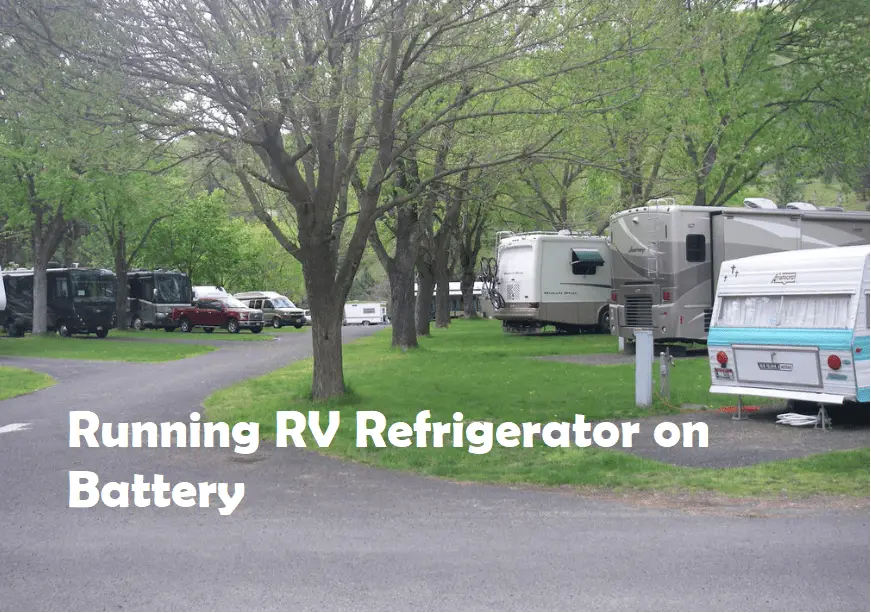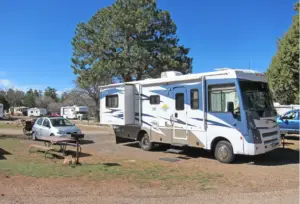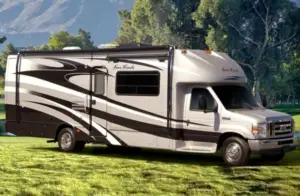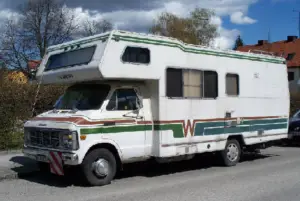RV refrigerator is an important appliances while camping in RV. It keeps the food cool and fresh. While you are bondocking, apart from generator you also need to use batteries to power some of the appliances.
A refrigerator too can be powered using a 12 V dc battery. But, will it run for longer hours? Well, it depends on lots of factors and battery may not be the ideal way to power refrigerator or any other bigger appliances.
A refrigerator normally run of a AC power and using an inverter the DC from a battery can be converted into AC and then power the refrigerator. A 3 way refrigerator comes with propane and DC battery as source apart from the AC power source.
Solar panels have also become popular with increasing efficiency and the cost not so very high. Even though there are lots of limitation with solar powered energy, it still can power bigger appliances like refrigerator or air conditioner. While you are camping deep inside without any hookup, you need to take help from these other sources to keep the appliances running.
A RV refrigerator or a residential refrigerator for Rv consuming around 150 watts while it is running would be drawing around 12 amps hour from a single 12 V battery. And under these conditions a RV refrigerator alone can run for around 4-5 hours using the 12 V battery supplying around 100 amp hours.
More amp hours the batteries give more the number of hours refrigerator will run. Having more number of batteries will provide for more hours.
Most common dometic or narcold refrigerators made specially for RV can last for around 6 to 8 hours on 12 V DC battery depending on the size of the refrigerator.
A smaller boondocking fridge consuming less than 70 watts can last longer than 30 hours.
It makes sense to have such a smaller fridge if you are more into boondocking. With residential refrigerator, boondocking with shore power will be difficult. And, you will need to use generator more often and even the battery would drain faster. Having a number of batteries totaling more than 800 amp hours can help in boondocking.
When one is boondocking, you would be using battery to power not only refrigerator but also other appliances like water pump or lights. And thus, if you have residential refrigerator in your motorhome then better have a high amp hours battery. You would at-least need 700 amp hours to run for a day. Getting a good battery like this one on amazon is thus critical,
Checking the actual consumption by RV refrigerator
To check how much is the consumption, one activity you can do is to put off all the devices that run on battery and keep only fridge ON. With this, check the meter reading and see how many amps are being drawn. Amps drawn are basically the per hour wise and with a normal RV battery of around 100 amps you can easily count on the hours.
Amps, watts, voltage. oh my! It can be confusing. Isn’t it? Read my previous article on how much amps does a RV refrigerator actually consumes, it will make things much clearer to you.
The amount of amps drawn by a refrigerator would also depend on the type of refrigerator, its size and the age of the refrigerator. Thus having the right refrigerator matter a lot. You can check this RV refrigerator on amazon, its the right one for many of us.
Also, if you use the refrigerator more often then the drawn amps will be more. Features like climate control will add on the amps drain as well. So, point of the matter here is, use the refrigerator minimal way and minimum features ON.
Having most of your appliances on DC power in parallel will lead to draining of the battery. So, get your priorities right and put on the devices on DC power accordingly.
If you have the luxury of charging batteries once in a day, then it shouldn’t be a problem for you. Make sure you charge the batteries fully before turning off the charging.
Different sources for RV refrigerators
While running the refrigerator in RV on shore power or direct hookup is the best, you also get option to run on other sources. With multiple power options you can always switch between them and take the advantage. Along with 110 V electricity power they also run on propane and DC battery as explained above.
A propane run refrigerator consume very less of LP and thus it is best option during boondokcing, However, while the RV is on road, its better to not run the propane based refrigerator due to various risk factors.
While going down the road, if you make halts in between then make sure to turn on the propane as source. propane is a good alternative to shore power except when you are going down the road.
If you are boondocking, one can also use solar panels to charge the battery during day times. This will allow for longer usage. if you are connected to shore power, then there is no need to use either propane or even batteries.
Another important point to make sure is, do not be dependent on battery alone. Use the battery only when its absolutely needed and switch to propane or shore power as-and -when you get the chance.
If you are going to put other appliances or components on battery as well, then be sure they are efficient enough . Like having a LED lights instead of normal ones will save a lot. It will consume less than 70% and this will extend the usage overall.
Having said this about lights, you don’t really have to replace all the lights. Just focus on which are the ones that get used most and plan for the replacements. With newer models you can get LED installed from the beginning itself. Its small thing but makes an impactfull difference.
Also, putting your batteries for microwave or air conditioner may not be a practical way and thus avoid as far as possible.
Watts drawn by RV refrigerator
A RV refrigerator on an average would draw around 150-180 watts while running. If you compare this with other appliances then air conditioner is other appliances that consumes similar or more watts. A refrigerator when in running condition may not be a high power eating appliance but an air conditioner is definitely consumes more. It takes a whole lot more than a refrigerator does. Here is the my previously posted detail guide on RV AC watts consumption.
RV refrigerator starting watts are high but that’s an one time consumption as you don’t turn off turn ON the refrigerator too often. Defrosting again will take more watts. You may want to defrost the fridge once in while only though.
Among other appliances a TV would take less than 100 watts. Lights depending on the watts, whether its 60 watts or lesser. An LED light would consume way lesser than normal lights.
Getting the right battery size
So, while bondocking how much battery do you really need then? Well, it is not only going to be refrigerator but also few other appliances along with lights that will need battery.
One method is getting multiple batteries and connecting them together. If you own that big luxurious Class A motorhome , then you will also have bigger batteries installed. Lets understand series and parallel connection in battery.
Connecting batteries in series increases the voltage but not the amps. For example, if you connect two 6 Volt batteries in series then that will give you 12 V but the amps wont increase.
To increase the amps, connect batteries in parallel. Like connecting two 12 volts batteries in parallel will provide you more than 150 amps. You need to calculate the usage of all your appliances and then configure the batteries. You can use multiple batteries and connect them in series or parallel combination to get the required 12 Volts and sufficient amps for all your appliances.
While boondocking you will mostly be using the lights, refrigerator and other appliances like microwave or water pump occasionally. Planning the usage and having a good generator to recharge the batteries and run some of the AC appliances will be needed. A motorhome will have properly planned appliances as compared to smaller RV’s like pop up camper or travel trailer.
Keeping the batteries in good conditions
While the batteries provide for power in condition that have no other sources, it is necessary that you take sufficient care of them. Most common reason why RV batteries fail early is because they are undercharge or even overcharged. Make sure the batteries do not loose the charge less than 50%.
Check my detailed guide on how to identify if the RV battery is going bad.
Batteries are to be charged only to the point its needed and do not overcharge them. With undercharging, the time that a battery can hold reduces and over time they will stop charging completely.
Keeping the batteries not fully charged during storage will also affect the batteries. Make sure that the batteries remain fully charged. On an average a battery would self discharge around 5% per month. So, keeping a closer look and charging them once in while during winter is recommended.
Some people keep the charger connected continuously. Mostly the automatic ones, but that can be bad for the batteries. Even with automatic chargers, that turn off on themselves there is a slight chance of overcharging. And you definitely don’t want that to happen.
On an average with good care and charging as per recommendation a RV battery can last for more than 5 years. Go through my detailed post that discusses more on RV batteries life and maintenance.
No matter whether you have a travel trailer or a class c RV make sure the batteries are given enough care and proper charging.
Refrigerator running while going down the road
With 2 way refrigerators being more common now, you are left with only propane as the source while traveling. But, running a propane fridge during travel is not ideal and you should avoid it.
So, what do you do while traveling. How to keep food cool during the on road time. Well, there are multiple things that can be done, here is a post that i had published on keeping refrigerator cool while traveling. Lets get the summary here,
- Keep the refrigerator doors closed most time and open only when needed.
- Turn on the refrigerator at-least 24 hours before starting.
- Pack the refrigerator properly. Include frozen food if possible.
- Can use ice bags to supplement as a cooling agent
- Have a small battery fan to circulate air inside the refrigerator
- If you make long halts don’t forget to turn on the refrigerator on propane
RV refrigerator working
RV refrigerator are different than normal house refrigerators, they run on an absorption mechanism and do not have any moving parts. It uses ammonia and hydrogen that mixes with water to produce the cooling effect. With RV being moving vehicle, the absorption mechanism works best for them.
Residential refrigerators too have made into RV’s and are becoming good for RV usage. But, for boondocking you would need fridges that consume less. A residential refrigerator normally needs more watts and thus running them off battery is difficult.
As long as you use the refrigerator with care and do regular cleaning, maintenance it will work fine. RV refrigerates do face many issues, check out this detailed guide on common RV refrigerator issues.





